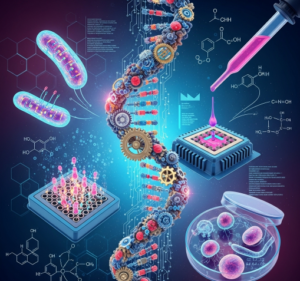The global synthetic biology market was valued at USD 14.30 billion in 2024 and is projected to reach USD 17.09 billion in 2025. By 2032, the market is expected to grow significantly to USD 63.77 billion, registering a robust compound annual growth rate (CAGR) of 20.7% during the forecast period. In 2024, North America led the synthetic biology market, accounting for a dominant share of 52.09%.
The synthetic biology market is rapidly expanding, driven by advancements in genetic engineering, biotechnology, and computational biology. This innovative field combines principles of biology and engineering to design and construct new biological parts, devices, and systems for a wide range of applications. The market is witnessing increasing adoption across healthcare, agriculture, industrial manufacturing, and environmental sectors. Rising demand for sustainable solutions, bio-based products, and precision medicine is further fueling market growth. As research and development activities accelerate and technological capabilities improve, the synthetic biology market is expected to play a transformative role in shaping the future of biotechnology and life sciences.
Continue reading for more details:
https://www.fortunebusinessinsights.com/synthetic-biology-market-107168
Market Segmentation
- By Product Type: The synthetic biology market is segmented into synthetic DNA, synthetic genes, synthetic cells, chassis organisms, and others, with synthetic DNA being the most widely used.
- By Technology: Includes gene synthesis, genome engineering, sequencing, bioinformatics, and cloning technologies. Gene synthesis and genome editing hold significant market shares in the synthetic biology market.
- By Application: Segmented into healthcare, agriculture, industrial biotechnology, environmental applications, and others. Healthcare dominates the synthetic biology market due to its use in therapeutics and diagnostics.
- By End User: Includes pharmaceutical & biotechnology companies, academic & research institutes, and healthcare providers. Pharma and biotech companies are the leading end users in the synthetic biology market.
- By Region: North America, Europe, Asia Pacific, Latin America, and Middle East & Africa form the regional segments of the synthetic biology market.
List Of Key Synthetic Biology Companies Profiled
- Hoffmann-La Roche Ltd(Switzerland)
- Illumina, Inc. (U.S.)
- Thermo Fisher Scientific Inc. (U.S.)
- Bio-Rad Laboratories, Inc (U.S.)
- Oxford Nanopore Technologies plc. (U.K.)
- Laboratory Corporation of America Holdings (U.S.)
- Agilent Technologies, Inc. (U.S.)
- Myriad Genetics, Inc. (U.S.)
- QIAGEN (Germany)
- Quest Diagnostics Incorporated. (U.S.)
- Danaher Corporation (U.S.)

Market Growth
- The synthetic biology market is experiencing robust growth due to advancements in gene editing technologies and increased applications across healthcare, agriculture, and industrial sectors.
- Rising demand for sustainable and bio-based products is accelerating the expansion of the synthetic biology market.
- The synthetic biology market is benefiting from increased funding and investments from both public and private sectors for research and development.
- Growing adoption of synthetic biology in drug discovery, vaccine development, and personalized medicine is contributing to market growth.
- Collaboration between academic institutions and biotech companies is further driving innovation in the synthetic biology market.
Restraining Factors
- High research and development costs are a major challenge limiting the growth of the synthetic biology market.
- Regulatory and ethical concerns surrounding genetic modification pose significant restraints on the synthetic biology market.
- Technical complexity and lack of skilled professionals affect the widespread adoption of synthetic biology technologies.
- Limited standardization and data integration across platforms can hamper the efficiency of synthetic biology market operations.
- Concerns about biosafety and biosecurity continue to slow acceptance in certain regions within the synthetic biology market.
Regional Analysis
- North America leads the synthetic biology market due to advanced research infrastructure, strong government support, and the presence of leading biotech firms.
- Europe holds a significant share of the synthetic biology market, supported by increasing investments and favorable regulatory frameworks.
- Asia Pacific is emerging as a key region in the synthetic biology market, driven by a growing biotechnology sector and supportive government policies in countries like China and India.
- Latin America and Middle East & Africa show gradual growth, with expanding research initiatives and rising interest in synthetic biology for agricultural and environmental solutions.
- The global synthetic biology market is witnessing expanding regional participation, with both developed and developing nations contributing to innovation and commercialization efforts.